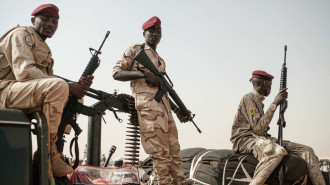Follow us on Twitter: @The_NewArab
Sudanese are now adding red to their blue profile pictures on social media. Here's why
Supporters of Sudan's protest movement changed their profile pictures across social media from blue to a split red-blue to draw attention to the ongoing humanitarian crisis in Yemen.
The trend began earlier this week, when social media users across all platforms took action to raise awareness about the ongoing atrocities taking place in Sudan by changing their profile images into blue in solidarity with protesters.
The trend, which began in response to the Eid massacre which left more than 100 killed last week, picked up overnight and has seen social media platforms such as Twitter, Facebook and Instagram covered in a shade of blue to counter the internet and media crackdown in the country.
This shade of blue may now feature prominently alongside red, as social media users direct attention to the conflict in Yemen - where a Saudi-led coalition is backing the government in a war against Houthi rebels.
Fake Instagram accounts, meanwhile, have sought to take advantage of the blue profile picture trend by promising to provide one meal to a Sudanese child for every story repost in a bid to gain followers, The Atlantic reported. The largest of these, SudanMealProject, amassed almost 400,000 followers in less than a week.
|
In-depth: Why is everyone on social media changing their profile pictures into blue?
The particular shade of blue was used to honour Mohammed Mattar, one of the victims of the massacre, whose profile pic was changed to the same image prior to his death.
'Deliver to the gallows'
Sudan's de facto leader and deputy leader of Sudan's military junta, Mohammad Hamdan Daglo, promised on Sunday to deliver to the "gallows" those responsible for the brutal massacre earlier this month.
Dagalo, known by his nickname Hemedti, is widely seen by protesters to be responsible for the bloody crackdown.
Hemedti is also the commander of the Rapid Support Forces (RSF) - an offshoot of the feared Janjaweed militias.
As Janjaweed forces stormed the sit-in, they are accused of having brutally beaten protesters, raped demonstrators and doctors, looted stores and civilians and shot dozens of people dead.
At least 40 bodies of those murdered at the vast sit-in site were thrown into the river Nile, many of them weighed down in an apparent attempt to hide the extent of the massacre, the Central Committee for Sudanese Doctors (CCSD) said.
The crackdown continued for days as Janjaweed forces roamed the city.
At the same time, the ruling military junta closed off Sudan from access to the internet - a measure still in place almost two weeks later.
Agencies contributed to this report.







 Follow the Middle East's top stories in English at The New Arab on Google News
Follow the Middle East's top stories in English at The New Arab on Google News
![Lebanon after strikes [Getty]](/sites/default/files/styles/image_330x185/public/2184409977.jpeg?h=a5f2f23a&itok=7wpfQMyI)
![G20 Brazil [Getty]](/sites/default/files/styles/image_330x185/public/2184389194.jpeg?h=a5f2f23a&itok=t1DchCMY)
